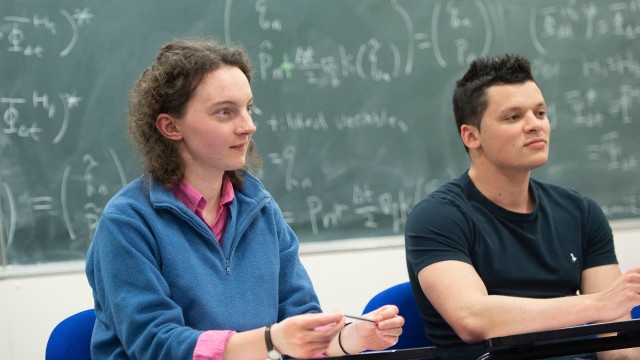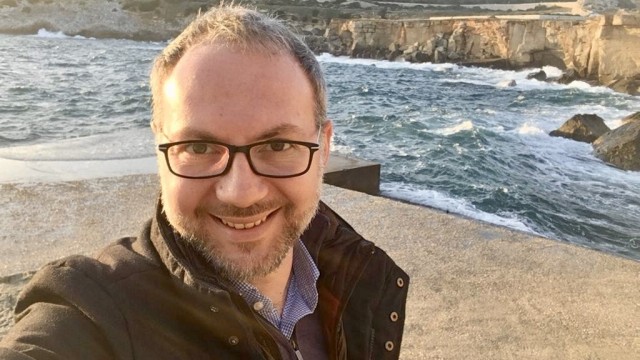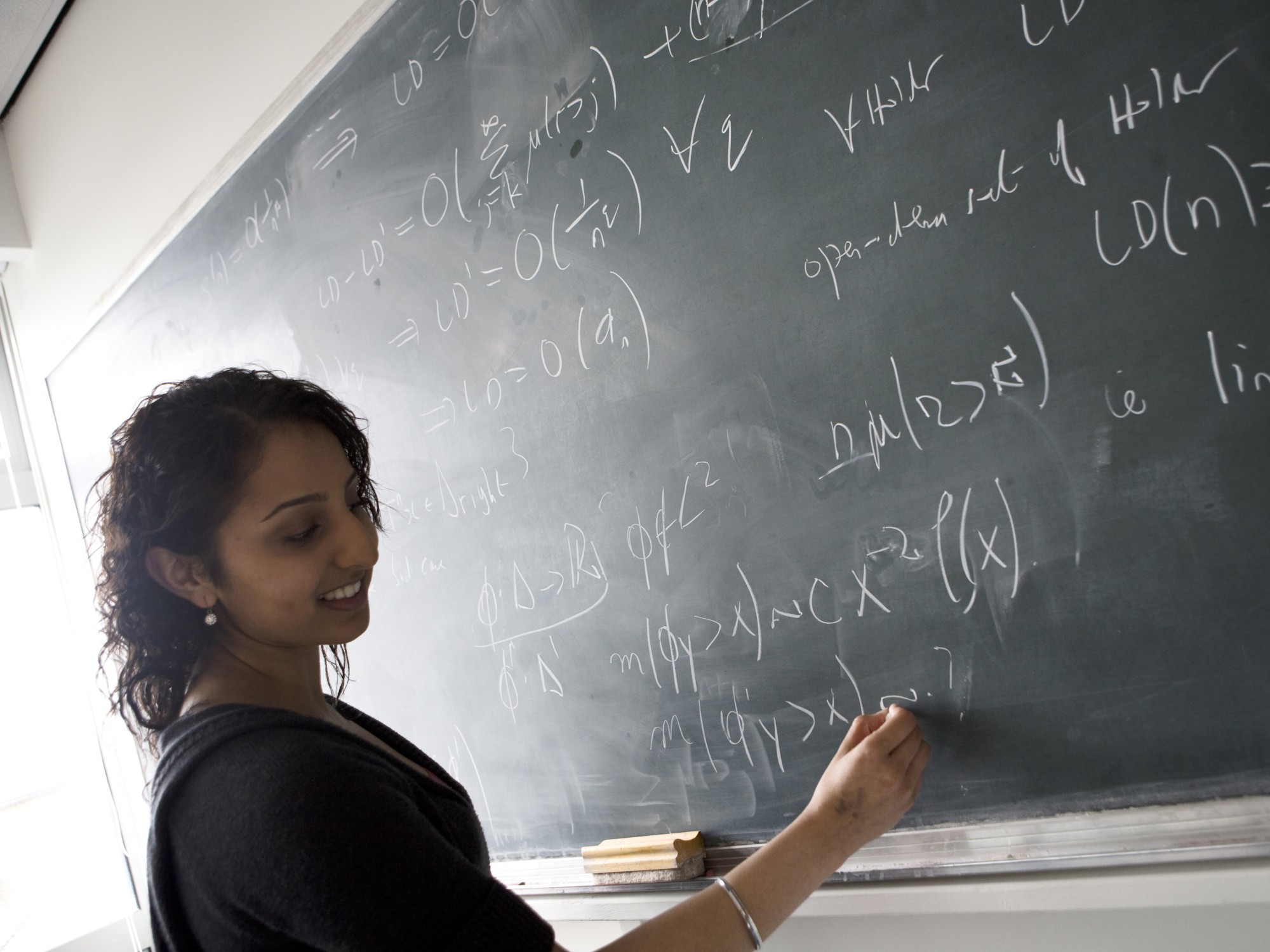
- Mathematics
PhD Mathematics
From geometry and partial differential equations to fluid dynamics, data science and modelling within the life sciences, mathematics at Surrey offers an extraordinary range of research opportunities that lie at the heart of the critical scientific questions of our age.
4,138+ people have created a bespoke digital prospectus
Why choose this
programme?
Our teaching staff are leaders in their fields, and they offer support for innovative research in a lively, inspiring and intellectually stimulating environment. Our research cuts a broad swathe through both pure and applied areas of mathematics, and we’re unique in the strong emphasis we place on research at the interface between pure and applied mathematics.
As well as developing cutting-edge mathematics, our research also involves innovative applications in areas such as data analytics, wave energy, drug development, ecology, biological systems, mathematical physics, climate change and meteorology, crime forecasting and prevention, and machine learning.
We work closely with other academics, industries and research groups, ranging from internal collaborations with the Surrey Sleep Research Centre, the Surrey Institute for People-Centred Artificial Intelligence and the School of Veterinary Medicine, to partnerships with other institutions from around the globe. Our national and international collaborators include: Harvard, Los Alamos, MIT, Oxford, Cambridge, Imperial and the ETH Zurich; leading businesses, such as AstraZenica and Offshore Wave Energy Limited; and government agencies, such as the Animal and Plant Health Agency, the MET Office and Surrey Police.
We’re part of the MAGIC network, which provides a large selection of PhD courses in pure and applied mathematics, so you’ll be able to explore these fields during your time with us. We also have a joint Mathematics PhD course in partnership with the University of Milano-Bicocca in Italy.
Statistics
100%
Of our mathematics research graduates are in employment or further study within 15 months of graduating (Graduate Outcomes 2025, HESA)
Top 20 for research outputs
The University of Surrey ranks top 20 in the UK for the overall quality of our research outputs (REF 2021)
What you will study
Our PhD in Mathematics will give you extensive training for a career as a professional mathematician, ready for a future in academia, industry, government, or a wide variety of other fields.
You’ll work closely with one or two supervisors, who you’ll meet frequently to discuss your research and your career development. They’ll oversee your progress, guide your critical thinking and offer advice throughout your studies.
During the first few months of your PhD, you’ll enrol and attend a series of induction events, and work with your supervisor to design a personal development plan, which you’ll update throughout your PhD.
You’ll complete a number of taught modules, including assessments, to broaden your mathematical knowledge. Most of these will be completed in your first year, with some completed in your second year. These include taught courses from MAGIC, the London Taught Course Centre and the Academy for PhD Training in Statistics, plus our own masters-level modules. You’ll also get training when attending department research seminars aimed at both staff and PhD students. On average, you’ll be attending approximately one or two research seminars a week.
In your second year, you’ll be required to complete a confirmation report and pass an internal viva examination. You’ll present your research in your research group seminar and be encouraged to design a research poster. You’ll usually start working on your first research paper together with your supervisors in your second year.
The last part of your PhD is all about advancing your research and completing your thesis. You’ll have regular meetings with your supervisor, who’ll work closely with you to help you manage your writing and make you critically reflect on the research you’ve done. Often, you’ll write and submit more research papers in this time.
We encourage all PhD students to take part in research summer and winter schools, and to present work at national and international conferences. We can support your travel to these events.
Assessment
Your final assessment will be based on the presentation of your research in a written thesis, which will be discussed in a viva examination with at least two examiners.
You have the option of preparing your thesis as a monograph (one large volume in chapter form) or in publication format (including chapters written for publication), subject to the approval of your supervisors.
You’ll be assessed in the first 15 months of your PhD through a confirmation report and a viva with two internal examiners. You’ll also do short take-home examinations for online MAGIC courses and the assessments for any MSc modules you take.
Location
This course is based at Stag Hill campus. Stag Hill is the University's main campus and where the majority of our courses are taught.
Research themes
- Analysis of Hamiltonian, dissipative and delayed PDEs
- Calculus of variations and nonlinear elasticity theory
- Classical and quantum integrability
- Data analytics
- Data assimilation and data science for large geophysical and social systems
- Data science and statistical analysis
- Dynamical systems
- Epidemiology and ecology
- Ferro fluids
- Gauge/gravity field theory and string theory dualities
- Geometric mechanics
- Hydrodynamic stability
- Machine learning
- Mathematical criminology
- Multi-scale fluid flow analysis
- Nonlinear water waves and wave energy harvesting
- Numerics of differential equations, numerical bifurcation analysis
- Perturbation theory (regular and singular) and bifurcation analysis of Hamiltonian and near-Hamiltonian systems
- Quantum field theory, string theory and supergravity
- Sleep and circadian rhythms
- Topological field and string theory
- Twistor geometry and geometric analysis.
Research groups
Dr Cesare Tronci is your programme supervisor. See a full list of all our academic staff within the School of Mathematics and Physics.
Research support
The professional development of postgraduate researchers is supported by the Doctoral College, which provides training in essential skills through its Researcher Development Programme of workshops, mentoring and coaching. A dedicated postgraduate careers and employability team will help you prepare for a successful career after the completion of your PhD.
Facilities
As a PhD student, you’ll have your own desk and computer, and you’ll be based near to your supervisor.
MSc modules will be taught in small classrooms, normally with five to 15 students.
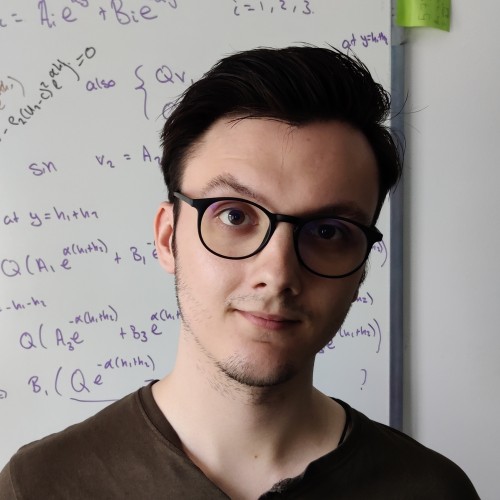
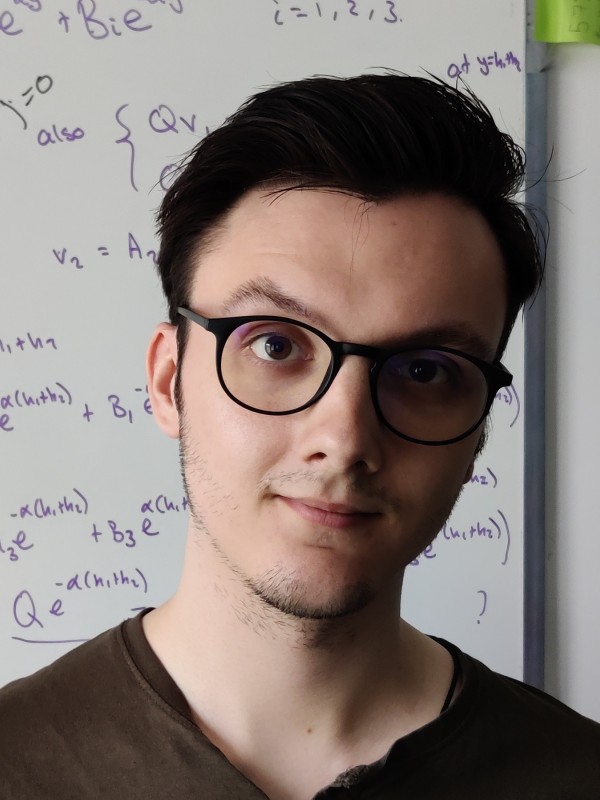
Ryan Poole
Student - Mathematics PhD

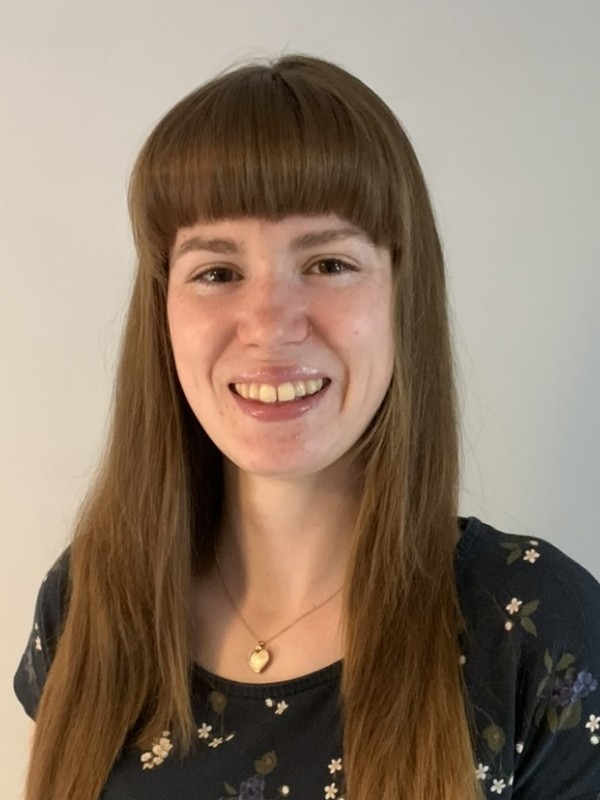
Jessica Furber
Student - Mathematics PhD
UK qualifications
Applicants are expected to hold a good first-class degree in an MMath, MPhys or MSc qualification, or a first-class honours degree in mathematics, physical sciences, or engineering.
English language requirements
IELTS Academic: 6.5 or above (or equivalent) with 6.0 in each individual category.
These are the English language qualifications and levels that we can accept.
If you do not currently meet the level required for your programme, we offer intensive pre-sessional English language courses, designed to take you to the level of English ability and skill required for your studies here.
Selection process
Selection is based on applicants:
- Meeting the expected entry requirements and providing all relevant documents including a satisfactory research proposal
- Being shortlisted through the application screening process
- Completing a successful interview
- Providing suitable references.
Fees per year
Explore UKCISA's website for more information if you are unsure whether you are a UK or overseas student. View the list of fees for all postgraduate research courses.
* Please note: any start date other than September will attract a pro-rata fee for that year of entry (75 per cent for January, 50 per cent for April and 25 per cent for July).
July 2026 - Full-time
- UK
- £5,006
- Overseas
- £23,900
July 2026 - Part-time
- UK
- £2,503
- Overseas
- £12,000
October 2026 - Full-time
- UK
- £5,238
- Overseas
- £24,900
October 2026 - Part-time
- UK
- £2,619
- Overseas
- £12,500
January 2027 - Full-time
- UK
- £5,238
- Overseas
- £24,900
January 2027 - Part-time
- UK
- £2,619
- Overseas
- £12,500
April 2027 - Full-time
- UK
- £5,238
- Overseas
- £24,900
April 2027 - Part-time
- UK
- £2,619
- Overseas
- £12,500
- Annual fees will increase by 4% for each year of study, rounded up to the nearest £100 (subject to legal requirements).
Additional costs
There are additional costs that you can expect to incur when studying at Surrey.
Funding
A Postgraduate Doctoral Loan can help with course fees and living costs while you study a postgraduate doctoral course.
Application process
Applicants should contact potential supervisors before submitting an application via the website. Please refer to section two of our application guidance.
Apply online
To apply online first select the course you'd like to apply for then log in.
Select your course
Choose the course option you wish to apply for.
Sign in
Create an account and sign into our application portal.
The closing date is the last day this month is available for applications, but if you are applying through a studentship you must follow the deadline on the advert to be eligible.
ApplyThe closing date is the last day this month is available for applications, but if you are applying through a studentship you must follow the deadline on the advert to be eligible.
ApplyThe closing date is the last day this month is available for applications, but if you are applying through a studentship you must follow the deadline on the advert to be eligible.
ApplyThe closing date is the last day this month is available for applications, but if you are applying through a studentship you must follow the deadline on the advert to be eligible.
ApplyThe closing date is the last day this month is available for applications, but if you are applying through a studentship you must follow the deadline on the advert to be eligible.
ApplyThe closing date is the last day this month is available for applications, but if you are applying through a studentship you must follow the deadline on the advert to be eligible.
ApplyThe closing date is the last day this month is available for applications, but if you are applying through a studentship you must follow the deadline on the advert to be eligible.
ApplyThe closing date is the last day this month is available for applications, but if you are applying through a studentship you must follow the deadline on the advert to be eligible.
ApplyAfter registration
Students are initially registered for a PhD with probationary status and, subject to satisfactory progress, subsequently confirmed as having PhD status.
About the University of Surrey
Need more information?
Contact our Admissions team or talk to a current University of Surrey student online.
Code of practice for research degrees
Surrey’s postgraduate research code of practice sets out the University's policy and procedural framework relating to research degrees. The code defines a set of standard procedures and specific responsibilities covering the academic supervision, administration and assessment of research degrees for all faculties within the University.
Download the code of practice for postgraduate research admissions (PDF).
Terms and conditions
When you accept an offer to study at the University of Surrey, you are agreeing to follow our policies and procedures, student regulations, and terms and conditions.
We provide these terms and conditions at the offer stage and are shown again at registration. You will be asked to accept these terms and conditions when you accept the offer made to you.
View our generic registration terms and conditions (PDF) for the 2025/26 academic year, as a guide on what to expect.
Disclaimer
This online prospectus has been published in advance of the academic year to which it applies.
Whilst we have done everything possible to ensure this information is accurate, some changes may happen between publishing and the start of the course.
It is important to check this website for any updates before you apply for a course with us. Read our full disclaimer.
